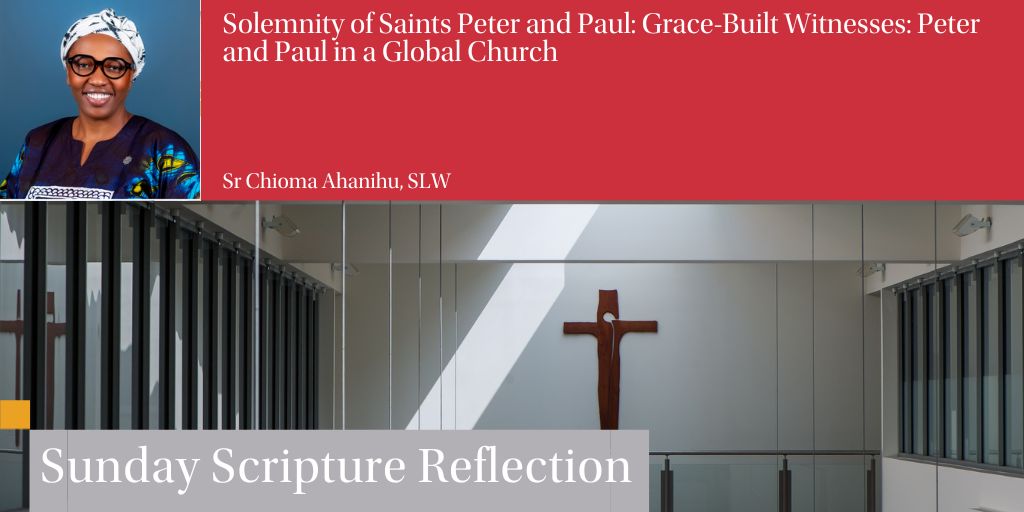

Readings:
Acts 12:1-11
2 Timothy 4:6-8, 17-18
Matthew 16:13-19
Theme: “Grace-Built Witnesses: Peter and Paul in a Global Church”
Dear sisters and brothers in Christ,
Today, the Church across the world pauses to celebrate two towering figures of our faith: Saint Peter and Saint Paul. These men were not simply prominent personalities in the early Church; they were vessels of God’s transforming grace, grace that reshaped their identities, redirected their
missions, and ultimately changed the course of Christian history. Their stories still speak powerfully to us today, as we seek to live with wisdom and build communities of peace and love in a world marked by fragmentation and complexity.
As we reflect on their lives, we are drawn to two essential moments: Peter’s renaming and Paul’s conversion. These moments reveal two distinct, yet complementary, models of Christian leadership.
In today’s Gospel, Jesus renames Simon as “Peter,” the Rock. This new name is not a mere title but a vocational calling. Peter is to be the foundation of the Church. But this foundation is not built on perfection. Peter was impulsive, fearful, and famously denied Jesus when it mattered most. And yet Jesus chose him. Why? Because Peter was willing to be forgiven. That willingness to receive mercy becomes the first mark of Christian leadership. Leadership, then, is not about achievement or authority but about surrendering to grace. Peter reminds us that our brokenness can become strength when touched by divine mercy. In a world that often prizes image, control, and reputation, Peter points us toward a more authentic path: leadership grounded in humility and vulnerability, made strong by grace.
Paul’s transformation unfolds differently. A Roman citizen and devout Pharisee, Paul began as a persecutor of the early Church. But on the road to Damascus, he was stopped by the risen Christ and given a new garment of faith. This encounter shattered his certainty and opened him to a new
vision of God and humanity. Paul had to confront his inherited religious framework to embrace the radical inclusivity of the Gospel. In doing so, he became the Gentiles’ apostle evangelizing with conviction and compassion. His life reminds us that Christian leadership also requires courage: the courage to face our limitations, challenge our assumptions, and be remade from within. Grace often comes not in clarity but in confrontation. And it is in these sacred disruptions that leaders are forged.
Peter and Paul are often portrayed together, Peter with keys, Paul with the sword. They came from different worlds: one rooted in Jewish tradition, the other shaped by Greco-Roman culture. Their relationship was not without conflict as Paul once rebuked Peter in Antioch. Yet both gave their lives in Rome for the same Lord. Together, they represent the Church’s ability to hold differences without division, to embrace tension without losing unity. This is the essence of Catholicity—not uniformity, but unity in diversity. A Church that lives in this tension becomes a witness to the world: a space where many voices, languages, and cultures are brought together in Christ.
Let me share with you an image of this Church still being built an image that came to me during my last home visit. I stood with a group of women farmers in a village community in Mbaise, Nigeria, under the soft, dry breeze of the harmattan sun. Their hands were stained red from the palm oil they had just pressed in a newly built community oil mill. Their laughter was full, honest, and free. These women were part of OLPODEV, which is a small but bold initiative that supports local women and youth in sustainable livelihoods. And it struck me deeply: this, too, is the Church not made of stone, but of lives poured out in service, in resilience, and in joy. A Church, built through work that unites, empowers and brings peace to the community. A Church where grace takes flesh in the daily labor of love and hope.
Peter and Paul laid the foundation, but the Church is still under construction in Rome and Rio, Manila and Mbaise, Chicago and Cairo. And it is being built with our stories, scars, and vocations. The world and the Church need your truth, our faithfulness, our imagination, and creativity.
So today, as we honor Saints Peter and Paul, let us recommit ourselves to be a Church of mercy, where failure is never final; a Church of mission, where no border silences the Gospel; and a Church of mutuality, where difference does not divide us but deepens our encounter with God.
May we, like Peter and Paul and like those women in Mbaise allow grace to find us, change us, and send us. Not because we are ready, but because Christ is faithful. And He builds His Church still, with the lives of all who say yes.
Sr Chioma Ahanihu, SLW